Overview
Proven strategies for tummy slimming capture attention by highlighting the significant benefits of wellness practices. These strategies involve a combination of:
- Nutritional adjustments
- Regular exercise
- Lifestyle modifications
- Hydration practices
These strategies specifically target both subcutaneous and visceral belly fat. Not only do these strategies aid in achieving a flatter stomach, but they also contribute to overall health and productivity. Evidence supports the link between specific dietary choices and exercise routines to effective weight management and enhanced well-being. Furthermore, implementing these strategies can transform your approach to health, making it essential for anyone seeking to improve their wellness journey.
Introduction
In a world where health and wellness are increasingly prioritized, understanding the complexities of belly fat has never been more critical. This article delves into the various types of belly fat, highlighting the stark differences between subcutaneous and visceral fat, and the significant health risks associated with the latter. It explores how visceral fat not only affects physical appearance but also poses serious threats to long-term health, contributing to conditions such as heart disease and diabetes.
Furthermore, the discussion extends to the workplace, where higher levels of visceral fat can lead to decreased productivity and increased absenteeism. By examining effective nutritional strategies, exercise regimens, and lifestyle modifications, this comprehensive guide aims to equip readers with the knowledge and tools necessary to combat belly fat and promote overall well-being in both personal and professional settings.
Understanding Belly Fat: Types and Health Risks
Belly fat is primarily classified into two types: subcutaneous fat, located just beneath the skin, and visceral fat, which encases vital internal organs. While subcutaneous fat is generally regarded as less harmful, visceral fat presents significant risks, including heart disease, diabetes, and metabolic syndrome. Grasping these differences is essential for applying effective strategies designed for tummy slimming and enhancing overall well-being.
Research highlights the risks of visceral fat, as it actively releases inflammatory substances that can lead to chronic conditions. This kind of fat is not merely a cosmetic issue; it plays a crucial role in long-term wellness and well-being. In fact, the World Health Organization has recognized the urgency of addressing the global obesity crisis, particularly the rise in childhood obesity, which has surged from 2% in 1990 to 8% in 2022.
This alarming trend underscores the need for effective medical systems to identify early weight gain and mitigate obesity progression.
Furthermore, the implications of visceral fat extend into the workplace. Case studies reveal that individuals with higher levels of visceral fat are more likely to experience fatigue and decreased cognitive function, adversely affecting productivity. Companies partnered with Foresight Health Coaching have demonstrated that promoting regular exercise and healthy lifestyle choices can significantly reduce presenteeism and absenteeism, fostering a more engaged and productive workforce.
Engaging in exercise for at least 30 minutes three times a week correlates with higher motivation levels at work. By prioritizing wellness initiatives that focus on tummy slimming through customized corporate programs, organizations can enhance staff well-being and foster a positive organizational culture. This proactive approach is essential for HR Benefits Managers aiming to improve overall team performance and productivity.
Foresight Coaching offers personalized wellness coaching and app-based delivery methods to support these initiatives, ensuring that employees receive the guidance they need to succeed. Additionally, showcasing the logos of our partnered firms reinforces our commitment to fostering a healthier workforce.
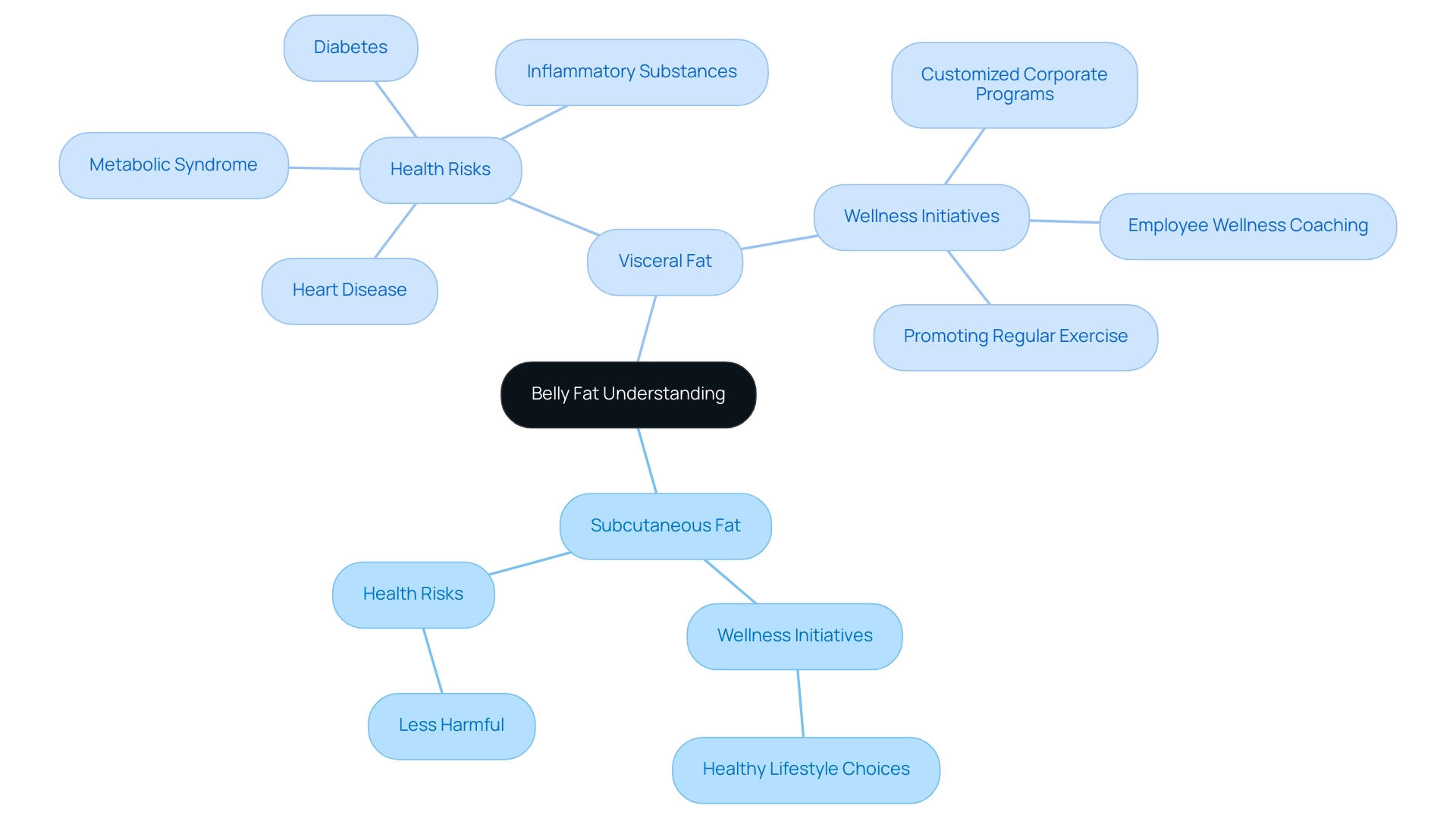
Nutritional Strategies for Reducing Belly Fat
To effectively reduce belly fat, consider incorporating the following nutritional strategies, supported by Foresight Health Coaching's comprehensive services:
-
Increase Fiber Intake: Foods rich in soluble fiber, such as oats, beans, and fruits, play a crucial role in regulating appetite and improving digestion. Research suggests that isolated soluble fiber supplementation can significantly improve body composition and metabolic health in overweight and obese individuals. A systematic review identified substantial interrater agreement in studies evaluating fiber's impact, with Cohen's κ for interrater agreement at 0.70, underscoring its effectiveness in managing body composition. Andrew Reynolds, a diabetes and obesity researcher at New Zealand’s University of Otago, states, "Any increase in fiber is good for you, especially for those on a low-fiber diet."
-
Limit Refined Carbs: Reducing the intake of refined carbohydrates—found in white bread, pastries, and sugary snacks—can stabilize blood sugar levels and decrease fat storage. Nutritionists stress that limiting these foods is crucial for successful tummy slimming, as they can lead to increased fat accumulation around the abdomen.
-
Prioritize Protein: Incorporating high-protein foods like lean meats, fish, and legumes can enhance feelings of fullness and promote muscle retention during weight loss. This is particularly important in corporate wellness programs, where maintaining energy levels and productivity is vital. Foresight Health Coaching provides customized nutritional guidance to assist individuals in making informed choices.
-
Stay Hydrated: Adequate hydration is essential for digestion and can help control hunger. Aim for at least eight glasses of water a day to support metabolic processes and reduce the likelihood of overeating. Foresight's wellness coaching app offers reminders and tips to assist individuals in staying on track with their hydration goals.
-
Mindful Eating: Practicing mindful eating by being attentive to hunger cues and minimizing distractions during meals can prevent overeating and encourage healthier food choices. This approach not only aids in weight management but also fosters a more positive relationship with food. Foresight Health Coaching emphasizes community support and one-on-one coaching to empower individuals in their wellness journeys.
-
Utilize the Wellness Coaching App: Foresight Health Coaching's wellness coaching app features daily programming, personalized workouts, and video demonstrations to enhance the user experience. These tools guarantee that staff can effortlessly obtain their tailored workouts, lessons, and nutrition advice anytime and anywhere, facilitating adherence to their wellness objectives.
By implementing these tummy slimming strategies, organizations can help their employees achieve healthier lifestyles, ultimately contributing to a more cohesive and productive team environment. Foresight Health Coaching's partnership provides organizations with an opportunity to cultivate a healthier and more cohesive team culture, reinforcing the importance of these nutritional strategies in corporate wellness initiatives.
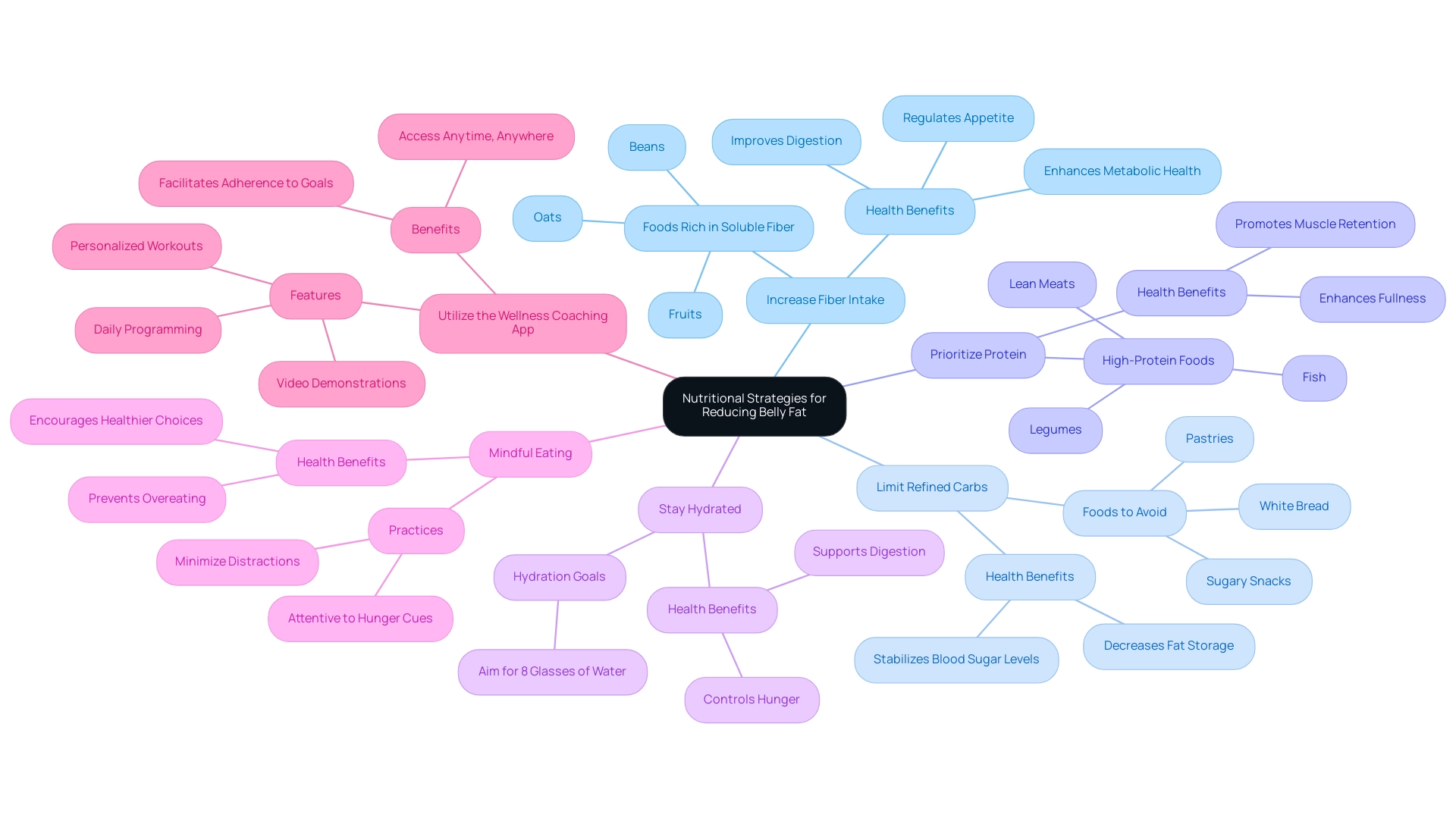
Effective Exercises for Targeting Belly Fat
Incorporating regular exercise into your routine is not just beneficial; it's essential for effectively achieving tummy slimming and enhancing overall well-being. Consider this: engaging in aerobic activities such as running, cycling, or brisk walking for at least 150 minutes per week is fundamental. These cardiovascular activities not only help burn calories but also significantly reduce visceral fat, which is linked to various health risks. With obesity rates reaching alarming levels globally, addressing belly fat is more important than ever. Foresight Health Coaching offers tailored programs that can assist employees in integrating these activities into their daily routines, supported by our comprehensive wellness coaching app.
Moreover, incorporating resistance training exercises, such as lifting or bodyweight workouts (e.g., squats, push-ups), at least twice a week is vital for building muscle and boosting metabolism. Research indicates that strength training can lead to a 15% increase in resting metabolic rate, aiding in weight management. Our personalized fitness coaching, provided via our app, ensures that individuals receive tailored program development to meet their specific needs.
Additionally, focusing on exercises that target the abdominal muscles—such as planks, bicycle crunches, and leg raises—strengthens the core and improves muscle tone. A strong core is essential for overall stability and can enhance performance in other physical activities. Understanding common myths about belly fat reduction, such as the belief in spot reduction, is crucial for setting realistic expectations. Our wellness workshops provide valuable insights into effective core training techniques, including in-person wellness talks and nutrition services as part of our corporate membership offerings.
Furthermore, High-Intensity Interval Training (HIIT) is a method that involves short bursts of intense exercise followed by rest periods, making it particularly effective for fat loss. Studies show that HIIT can lead to a 28.5% reduction in belly fat over a 12-week period, showcasing its efficiency in a time-constrained environment. The impact of HIIT on employee fitness can be significant, and Foresight Health Coaching can assist organizations in implementing HIIT sessions as part of their corporate wellness programs.
Finally, incorporating practices like yoga or Pilates enhances flexibility and core strength, supporting overall fitness and well-being. These activities not only enhance physical well-being but also contribute to mental clarity and stress reduction, which are crucial in high-pressure work environments. Our app includes daily programming that encourages participation in these beneficial practices, featuring video demonstrations to guide users through tummy slimming exercises, fostering a culture of health and unity within teams. By integrating these tummy slimming exercises into a regular routine, individuals can achieve a healthier waistline while also experiencing improvements in cardiovascular health, motivation, and workplace productivity. Foresight Health Coaching's corporate wellness programs can help organizations implement these strategies effectively, ensuring that employees have access to the tools and community support they need to succeed. Regular exercise is linked to substantial reductions in risks of cardiovascular disease, diabetes, hypertension, and premature death, even with small increases in physical activity.
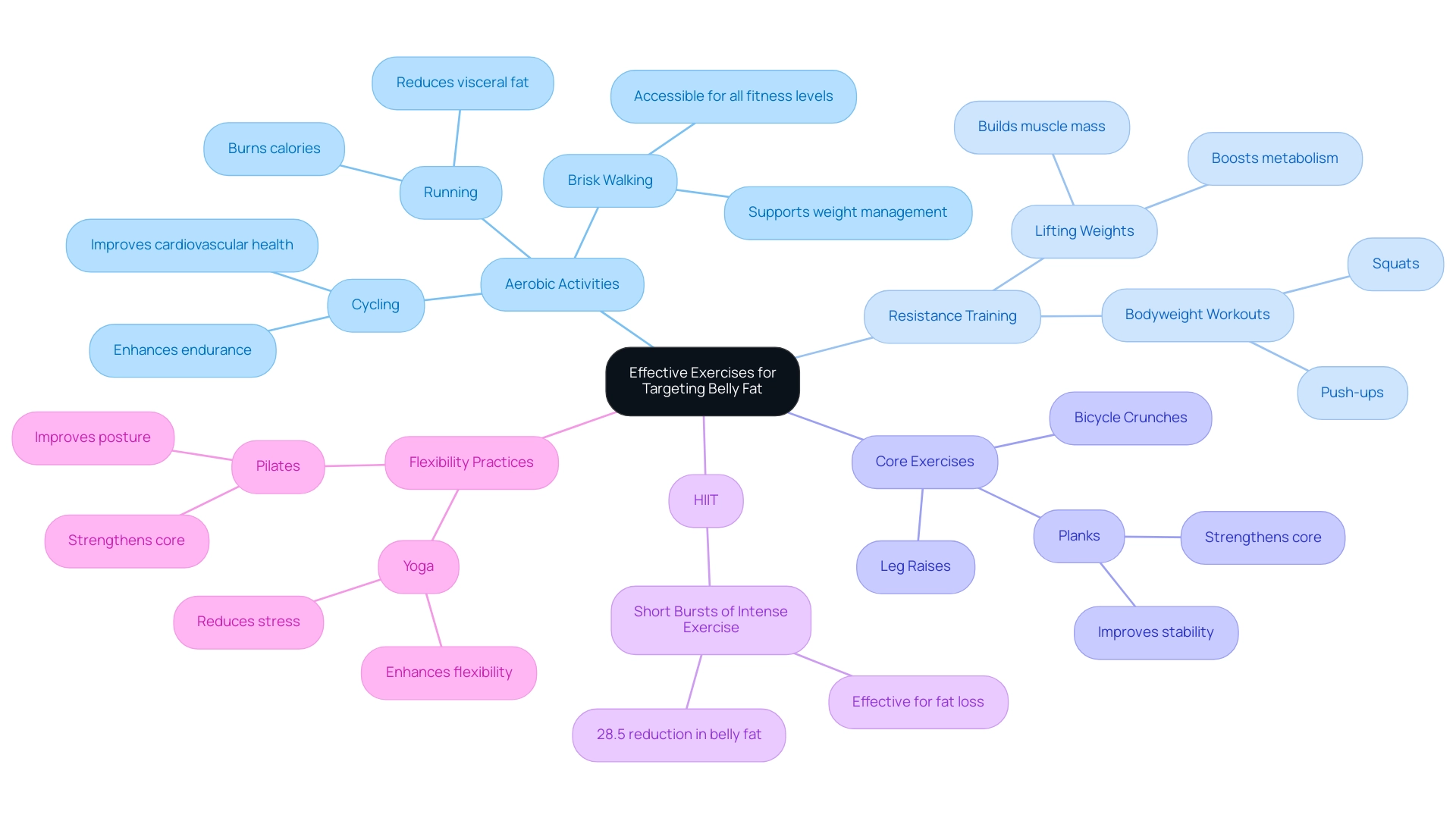
Lifestyle Modifications for a Flatter Stomach
To achieve a flatter stomach, consider implementing the following lifestyle modifications, supported by Foresight Health Coaching's comprehensive services:
-
Manage Stress: Chronic stress significantly contributes to an increase in mass, particularly in the abdominal area. Engaging in stress-reducing activities such as meditation, deep breathing exercises, or yoga can help mitigate these effects. Leslie Heinberg, a psychologist, states, "Things like exercise, meditation, mindfulness exercises, relaxation — those are ways that we can work toward effective stress management, as well as effective management of our health." Research indicates that effective stress management techniques not only promote loss but also enhance overall well-being, leading to a more productive work environment. Foresight offers tailored wellness workshops that equip employees with tools to manage stress effectively.
-
Prioritize Sleep: Aim for 7-9 hours of quality sleep each night. Insufficient sleep can disrupt the hormones responsible for regulating appetite and metabolism, making loss of pounds more challenging. Current studies highlight a direct correlation between sleep quality and body management, emphasizing that better sleep can lead to healthier eating habits and improved outcomes. Foresight's wellness coaching includes strategies to improve sleep hygiene as part of a holistic approach to well-being.
-
Limit Alcohol Consumption: Excessive alcohol intake is linked to weight gain and bloating. Moderation is crucial, as lowering alcohol intake can greatly affect body composition and general well-being. Organizations that promote responsible drinking habits within their wellness programs often see positive changes in employee health metrics. Foresight can assist in developing corporate wellness initiatives that address alcohol consumption.
-
Avoid Late-Night Eating: It is advisable to finish meals at least 2-3 hours before bedtime. This practice aids digestion and helps prevent gain in mass. Late-night eating can lead to increased calorie intake and disrupt sleep patterns, further complicating management efforts. Foresight's personalized nutrition coaching can help individuals establish healthier eating patterns.
-
Stay Active Throughout the Day: Incorporate movement into your daily routine by opting for stairs instead of elevators or taking short walks during breaks. Regular physical activity is crucial for maintaining a healthy weight and has been shown to enhance job performance, creativity, and stress management. Studies reveal that individuals who engage in physical activity report improved mood and reduced fatigue, contributing to a more engaged and satisfied workforce. Furthermore, case studies indicate that implementing exercise programs in the workplace can lead to reduced absenteeism and increased staff satisfaction, ultimately fostering a healthier and more cohesive team culture. Foresight Health Coaching provides tailored fitness coaching and app-based support to encourage daily activity.
By adopting these lifestyle modifications, individuals can work towards tummy slimming to achieve a flatter stomach while fostering a healthier, more cohesive team culture within their organizations. Foresight Health Coaching's partnership provides organizations with the tools and support necessary to promote these healthy habits effectively, including corporate memberships that cater to up to 30 employees, ensuring flexibility and scalability for all business sizes.
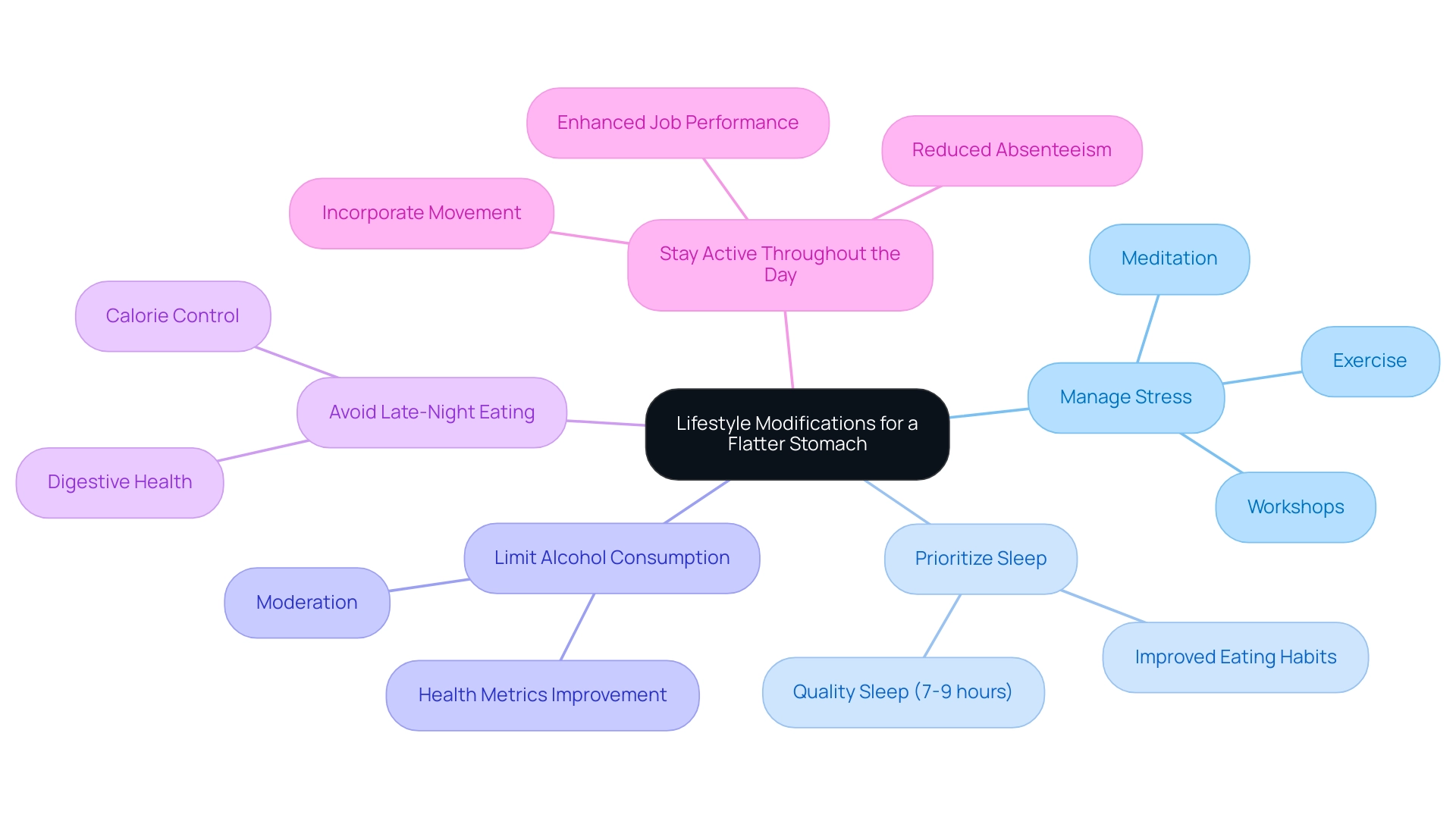
Hydration and Food Choices for Optimal Results
Hydration is a crucial yet often underestimated element of effective weight loss strategies. To enhance hydration and support your weight loss goals, consider the following key approaches:
-
Drink Water Before Meals: Consuming water prior to meals can significantly reduce appetite, leading to lower calorie intake and preventing overeating. Research indicates that individuals who drink water before meals may consume fewer calories overall, making this a simple yet effective strategy for managing body mass.
-
Incorporate Hydrating Foods: Foods with high water content, such as cucumbers, watermelon, and oranges, not only contribute to hydration but also provide essential nutrients. These hydrating foods can help maintain satiety while reducing overall caloric intake, supporting efforts for weight loss.
-
Limit Sugary Drinks: Replacing sugary beverages with water, herbal teas, or infused water can drastically cut down on unnecessary calories. Studies indicate that individuals who decrease their consumption of sugary drinks often experience considerable weight loss, as these beverages contribute to increased appetite and caloric surplus.
-
Monitor Caffeine Intake: While moderate caffeine consumption can enhance metabolism, excessive intake may lead to dehydration. Striking a balance is crucial; consider limiting caffeinated beverages and ensuring adequate water intake to maintain hydration levels.
-
Track Your Hydration: Aim for at least 8 cups of water daily, adjusting based on activity levels and climate. Utilizing a water tracking app can help maintain accountability and ensure you meet your hydration goals.
The advantages of adequate hydration extend beyond mere weight loss; they also contribute to tummy slimming. Adequate hydration has been linked to improved cognitive function and productivity in the workplace. Case studies have shown that individuals who maintain optimal hydration levels report higher energy and focus, leading to enhanced performance and reduced absenteeism.
Furthermore, drinking water before meals has been associated with better appetite control, as hydration can signal fullness to the brain. Nutritionists emphasize that water plays a crucial role in regulating appetite, making it an essential tool for tummy slimming in any weight loss strategy.
It's important to note that urine osmolality should be greater than 450 mOsm/kg in dehydration, highlighting the need for adequate hydration. Dehydration can lead to significant morbidity and mortality, making it critical for organizations to encourage hydration among employees to decrease these risks. By integrating hydration strategies into broader mental well-being initiatives, organizations can foster a healthier workforce.
As Audrey Cook, a mental health provider, states, "You don't have to be everywhere all the time, and you don't have to see everyone all the time," emphasizing the importance of self-care, including hydration, in maintaining overall health and productivity. By prioritizing hydration, organizations can nurture a more productive and engaged team.
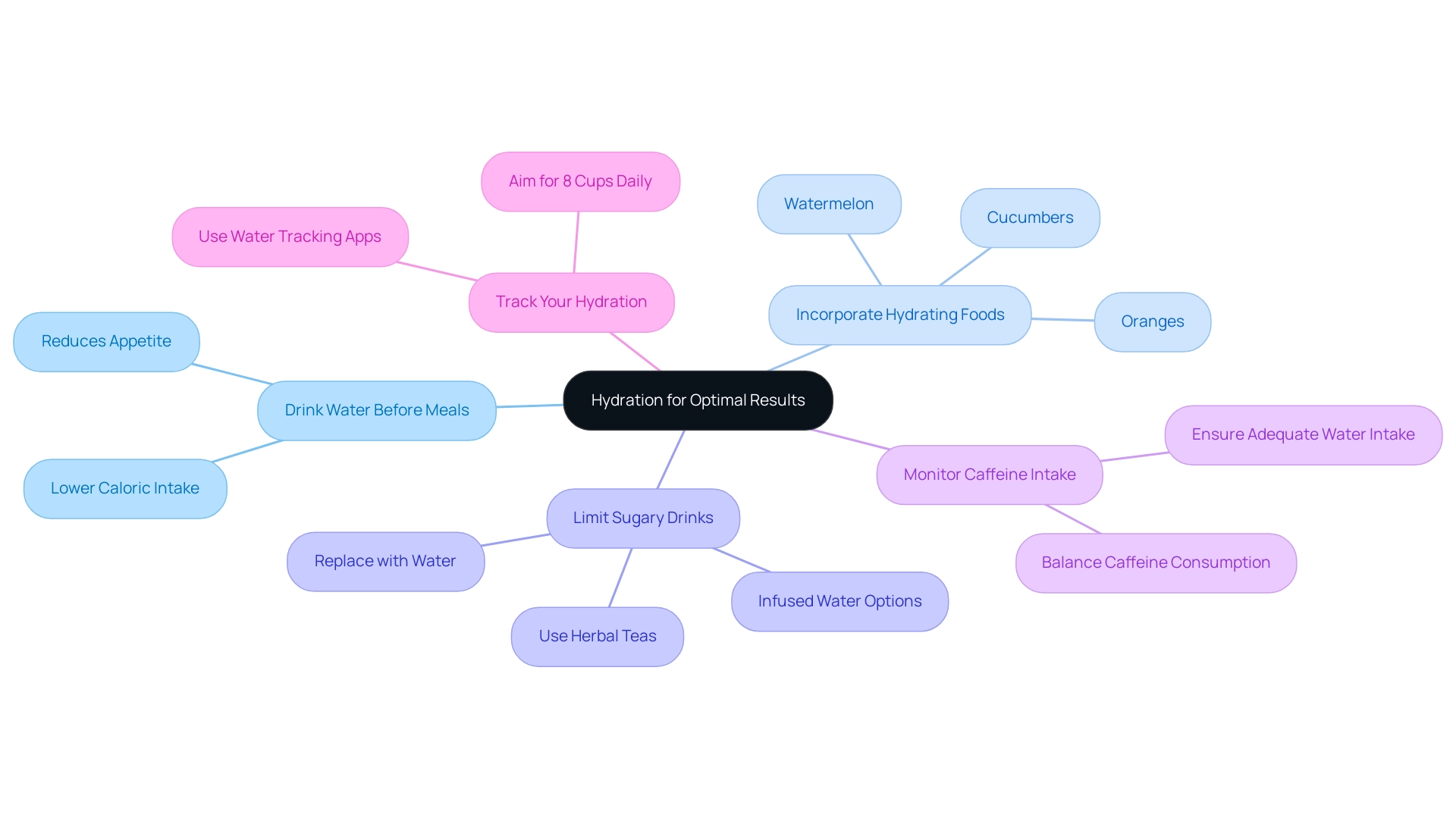
Cultivating a Positive Mindset for Weight Loss Success
Fostering a positive mindset is essential for attaining successful weight loss outcomes. Here are several effective strategies to cultivate this mindset, which can be seamlessly integrated into workplace wellness programs:
- Set Realistic Goals: Establish specific, achievable goals that allow for tracking progress and maintaining motivation. Research indicates that individuals who set higher weight loss goals tend to experience greater success, with those aiming for more than 10% weight loss weighing less at baseline compared to those with lower goals. Additionally, participants driven by fitness reasons lost 0.38 kg more than those inspired by appearance at 24 weeks, highlighting the significance of motivation type in achieving weight loss success.
- Practice Self-Compassion: Embrace kindness towards yourself during setbacks. Understanding that weight loss is a journey filled with challenges can help alleviate feelings of frustration and encourage resilience.
- Visualize Success: Engage in visualization techniques by picturing yourself achieving your weight loss goals. Studies show that 59% of individuals who visualize their success report increased confidence, significantly enhancing motivation and commitment.
- Surround Yourself with Support: Build a network of support by engaging with communities or groups that share similar health goals. This environment fosters encouragement and accountability, essential components for sustained motivation. Foresight Health Coaching provides customized support and guidance tailored to your team's needs, ensuring that staff feel valued and empowered.
- Celebrate Small Wins: Acknowledge and celebrate every step of progress, no matter how minor. Recognizing these achievements reinforces positive behaviors and keeps motivation levels high.
Incorporating these strategies into workplace wellness programs can lead to a more engaged and motivated workforce. Current research underscores the importance of a positive mindset in weight loss, revealing that employees who exercise regularly for at least 30 minutes three times per week are more likely to report feeling motivated at work. By promoting a culture of wellness and unity, organizations can enhance overall productivity and well-being. Foresight Health Coaching encourages organizations to invest in their team's health to nurture a stronger and more resilient team culture, ultimately maximizing performance and reducing absenteeism.

Conclusion
Understanding the complexities of belly fat is essential for both personal health and workplace productivity. This article emphasizes the critical distinction between subcutaneous and visceral fat, highlighting the latter's serious health risks, including heart disease and diabetes. Recognizing these dangers is the first step toward implementing effective nutritional strategies and exercise regimens necessary for reducing belly fat.
The exploration of nutritional strategies reveals that:
- Increasing fiber intake
- Limiting refined carbohydrates
- Prioritizing protein
can significantly aid in weight management. Coupled with regular exercise—ranging from cardiovascular activities to strength training—individuals can foster a healthier lifestyle that not only improves physical appearance but also enhances overall well-being. Furthermore, lifestyle modifications such as stress management, prioritizing sleep, and staying active throughout the day further contribute to achieving a flatter stomach.
Moreover, the article underscores the importance of hydration and a positive mindset in the weight loss journey. Proper hydration can regulate appetite and enhance cognitive function, while cultivating a supportive environment and setting realistic goals can foster motivation and resilience. Organizations that invest in wellness programs and promote healthy habits among employees can witness a substantial increase in productivity and a decrease in absenteeism.
Ultimately, addressing belly fat is not just a personal health concern but a collective responsibility that impacts workplace dynamics and overall community well-being. By integrating these strategies into daily routines, individuals and organizations alike can create a culture of health that leads to long-lasting benefits for everyone involved.




